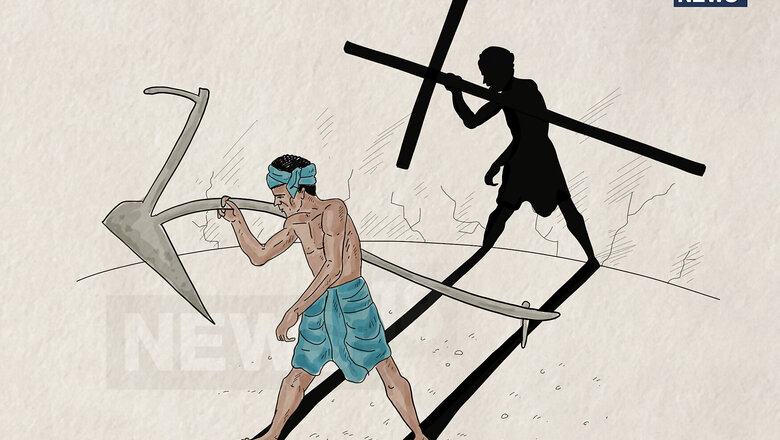
views
Thousands of aggrieved farmers from Uttar Pradesh, Punjab, Haryana, Uttarakhand and Rajasthan had gathered at the Delhi-Uttar Pradesh border near Ghazipur on Tuesday.
Their plan was to march into the national capital, reach Kisan Ghat and present their demands to the government. They were, however, stopped in their tracks by police barricading, lathicharge, tear gas and water cannons. They waited all day on the street before police removed the barricades after midnight, finally allowing them to proceed to Kisan Ghat.
The demands of the Bharatiya Kisan Union (BKU), were not met. Gajendra Shekhawat, Minister of State for Agriculture and Farmers Welfare, did try to negotiate with them, agreeing to seven demands out of eleven. But the farmers, who had been on the march for nine days, rejected the government’s offer, with Naresh Tikait, BKU president and leader of the Kisan Kranti Padyatra, saying their main grievances had not been addressed.
Some of their demands included subsidised electricity and fuel rates for farmers, release of delayed payment for sugarcane produce, GST-free sale of agricultural machines and implements, removal of ban on 10-year-old tractors in Delhi NCR region, pension for farmers over the age of 60 and linking MGNREGA with farming. But the main demand of farmers was the implementation of recommendations of the National Commission on Farmers headed by MS Swaminathan.
What is National Commission on Farmers
The National Commission for Farmers, also known as the Swaminathan Commission, was constituted in November 2004 by then Prime Minister Manmohan Singh after the UPA government came in power. The commission was headed by Dr M.S. Swaminathan, who was one of the leaders of the Green Revolution. The commission was tasked with addressing farmer suicides and the problems farmers were facing nationwide. They were mandated to make suggestions on issues such as:
1. A medium-term strategy for food and nutrition security in the country in order to move towards the goal of universal food security over time.
2. Enhancing productivity, profitability, and sustainability of the major farming systems of the country.
3. Policy reforms to substantially increase flow of rural credit to all farmers.
4. Special programmes for dryland farming for farmers in the arid and semi-arid regions, as well as for farmers in hilly and coastal areas.
5. Enhancing the quality and cost competitiveness of farm commodities so as to make them globally competitive.
6. Protecting farmers from imports when international prices fall sharply.
7. Empowering elected local bodies to effectively conserve and improve the ecological foundations for sustainable agriculture.
Recommendations of Swaminathan Commission reports:
The commission submitted five reports in December 2004, August 2005, December 2005 and April 2006 respectively. The reports contained suggestions to achieve the goal of “faster and more inclusive growth” as envisaged in the Approach to 11th Five Year Plan. The reports identified unfinished agenda in land reform, quantity and quality of water, technology fatigue, access, adequacy and timeliness of institutional credit, and opportunities for assured and remunerative marketing as the major causes of the agrarian crisis.
The reports recommended various reforms in different aspects of agriculture:
Land reforms
The reports recommended that diversion of prime agricultural land and forest to corporate sector for non-agricultural purposes be prevented. It also suggested that a mechanism to regulate the sale of agricultural land, based on quantum of land, nature of proposed use and category of buyer be set up, among other recommendations.
Irrigation
The reports recommended substantial increase in investment in irrigation sector under the 11th Five Year Plan apportioned between large surface water systems. It also urged that water supply must be boosted through rain water harvesting and aquifer recharge. The reports suggested a comprehensive set of reforms were needed for farmers to have a sustained and equitable access to water.
Productivity of Agriculture:
To achieve higher growth in productivity, the commission recommended substantial increase in public investment in agriculture related infrastructure particularly in irrigation, drainage, land development, water conservation, research development and road connectivity. The commission also suggested a network of advanced soil testing laboratories be set up nationwide to detect micro-nutrient deficiencies and improve soil health.
Prevention of farmer suicides:
The commission said farmer suicides must be made a priority issue and recommended that the National Rural Health Mission be extended to suicide hotspot locations on priority basis. The report said farmers must be provided affordable health insurance and primary health care centres must be revitalised. The commission also suggested that a State-level farmers’ commission be set up to ensure farmer representation and quick government response to their problems, and a Social Security net be provided with provision for old age support and health insurance.
Competitiveness of Farmers
The commission said it was crucial to raise the agricultural competitiveness of farmers with small land holdings. It stressed the need for improvement in implementation of Minimum Support Price (MSP) and said MSP must be at least 50 percent more than the weighted average cost of production. The commission also said commodity based farmers’ organisations such as Small Cotton Farmers’ Estates must be promoted.
Additionally, the reports made multiple suggestions to boost agricultural credit and insurance, food security, bio resources and employment. It was also suggested that swift action on import duties were needed so that farmers are protected from international price.
Farmers who joined the Kisan Kranti Padyatra from Haridwar to Delhi, claimed that several crucial Saminathan commission recommendations were yet to be implemented.
The farmers, after finally reaching Kisan Ghat and paying respects to former Prime Minister Chaudhary Charan Singh, returned to their villages early Wednesday morning. During the sit-in under the Ghazipur flyover on Tuesday farmers had said they had been ignored by the government. Before leaving, the farmers warned that their discontent would reflect in the 2019 Lok Sabha elections.













Comments
0 comment